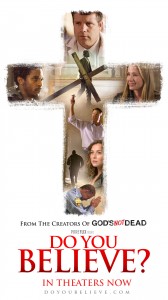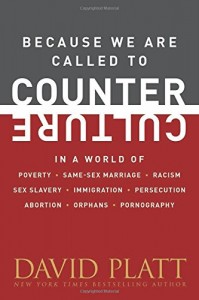
by Brian Hobbs | Mar 24, 2015
 From the creators of the hit Christian movie, “God’s Not Dead” comes a new release, “Do You Believe?”
From the creators of the hit Christian movie, “God’s Not Dead” comes a new release, “Do You Believe?”
Plot Summary
Starring recognizable actors including Cybill Shepherd, Lee Majors and Sean Astin, the movie follows “A dozen different souls—all moving in different directions, all longing for something more. As their lives unexpectedly intersect, they each are about to discover there is power in the Cross of Christ.”
Positive Elements
Many Christian movies today use amateur acting that can be hit and miss. By attracting professionals, “Do You Believe?” steps it up a notch in quality. The only “novice” actor would be Oklahoma’s own Brian Bosworth. “The Boz,” however, does have acting experience and plays a major role in the movie in the form of “Joe,” a rough but redeemed soul, who suffers from a significant ailment.
Without spoiling the plot, there is a wide variety of characters in the movie to which people can readily identify. There is a gang member, a grieved couple, a single mother, a stuck-in-a-rut pastor, a pregnant teenage girl, a post-traumatic war vet and others. By showing a wide array of characters, the movie will appeal to broad audiences.
There are various tense scenes in the movie that keep your attention, and the heart-touching moments have their proper effect, in my unprofessional opinion. While the movie’s budget I am sure does not compare to most (given that it had a limited release), the movie did not appear to be low budget.
Negative Elements
As previously mentioned, this movie follows the stories of 12 different people. This was a bit ambitious for a two-hour film, one that hinges on character development. The movie probably could have been done just as well with two to three fewer sub-plots. Aside from that, the movie makers brought it all together by the end and wrapped the plots together nicely.
Spiritual Content
While critics, and maybe even the average movie aficionado, will be critical or dismissive of the overtly Christian themes, the movie achieves what it set out to do: send a message. That message is the cross is central to life, that there is power in the cross of Christ. Not the mere symbol of the cross but the actual atoning death of Jesus Christ.
We may, the movie tells us, be able to disbelieve or try to discredit the cross, but we cannot ignore it. One scene in particular stands out. As someone contemplates suicide, the sudden appearance in their eye’s view of a cross deters them. It reminded me of the scene in Goethe’s classic book Faust, in which Dr. Faust is about to kill himself, until he hears the church bells ring at Eastertime. Even though Dr. Faust is an unbeliever, he recognizes the deep meaning of Easter until God can later save him from the clutches of the Devil.
Overall
Similar to other recent Christian movies, there is talk throughout about the Gospel, even while there is not a specific presentation of the Gospel that you would find in a sermon. Movie goers will walk away, though, thinking about the authenticity of their own beliefs. While “Do You Believe?” will not win an Academy award or be a box-office best-seller, all who see it can take its message to heart.
Rating: 2.75 stars (out of 4)

by Brian Hobbs | Mar 18, 2015
I admit it. I used to be, what society would call, “homophobic.” In my college years – to my regret and shame – I even wrote a public letter “coming out of the closet as homophobic,” in a mocking way and was copy-catting and parroting the (bad) example of a radically fundamentalist pastor.
Today, by God’s grace and by following the example of good pastors, I am no longer afraid of homosexuals. This does not mean, however, I am not afraid for homosexuals. Let me explain.
As a Christian who believes in the Bible and God’s standard for sexual behavior, I cannot take part personally or approve of sex outside of the male-female, one-flesh union of marriage.
This standard does not just leave out homosexual relations. It leaves no room for adultery, pre-marital sex, cohabitation, pornography, prostitution, polygamy and more.*
Throughout history and especially these days, this timeless standard that God Himself set down for our own good, does not win us friends. C.S. Lewis said this of the Christian moral standard of sexuality**:
“Chastity is the most unpopular of the Christian virtues. There is no getting away from it: the old Christian rule is, `Either marriage, with complete faithfulness to your partner, or else total abstinence.’ Now this is so difficult and so contrary to our instincts that obviously either Christianity is wrong or our sexual instinct, as it now is, has gone wrong. One or the other. Of course, being a Christian, I think it is the instinct which has gone wrong.”
In the Christian worldview, anyone who lives outside of these standards not only risks the fearful wrath of God in the Judgment Day, they risk the effects of a self-destructive behavior.
That, in the end, is my fear for homosexuals and others living in sexual brokenness and sin. I fear for their well-being in the here and the hereafter.
Asserting and defending this viewpoint is increasingly hard today, but if we take this viewpoint as Gospel-truth then we must, for the sake of truth and the good of others.
Real love, as the saying goes, warns of dangers ahead. Only a person who doesn’t truly care for you would not speak the truth in a gracious way.
Yet that last element, loving grace, was what I was missing in my sinful, homophobic attitude. I was trying to defend what I saw as right but in the totally wrong way. God, by His grace, is changing my attitude on this issue, but without changing my “latitude.”
In other words, I cannot change my – or rather our – principles, because they are not mine to change. I will, however, year by year, change and improve my approach and hopefully grow.
If you are reading this and self-identify as a homosexual, know that Jesus loves you and died to pay for your sins (and mine), all to reconcile us to God and make us whole and His.
Yes, Jesus loves you and wants to make you more like He is.
Please forgive my former homophobic attitude. Because of Jesus, I love you too, and I strive to become more like Him day by day.
End Notes:
*In Romans 1, 1 Corinthians 6 and other places in the New Testament, the Apostle Paul clearly lists various sexual sins, which includes homosexual acts. While some rightly point out that Jesus did not address homosexuality, our Lord did affirm the entire moral code of the Old Covenant and also challenged the divorce culture and polygamy and inherently the notion of same-sex unions by teaching that God’s plan for marriage is displayed in the pre-fallen Garden of Eden Union of Adam and Eve.
**Quote taken from Lewis’ masterpiece, Mere Christianity.

by Brian Hobbs | Mar 12, 2015
“In the Name of God, I, Brian, take you, Jennifer, to be my wedded wife, to have and to hold from this day forward, for better or for worse, for richer, for poorer, in sickness and in health, to love and to cherish; from this day forward until death do us part. In the Name of the Father and of the Son and of the Holy Ghost. Amen.”
In the presence of witnesses including my family, friends and God Himself, I spoke this vow to my wife nearly 14 years ago. From that day to this, we have seen a lot of changes to marriage in society. One of the more unnoticed trends, however, is that traditional wedding vows have fallen out of favor, and improvised wedding vows have become fashionable.
According to Russell D. Moore, president of the SBC’s Ethics & Religious Liberty Commission, this is a troubling trend, even one that coincides with the downgrade of marriage. Speaking to a group of pastors at the BGCO Conference on “The Gospel, Sexuality & the Church,” Moore says he has taken a lot of unpopular stands. But to tell a young couple he is about to marry that they cannot write their own wedding vows is the most controversial thing he does.
These days, says Moore, wedding ceremonies have been overtaken by folks like wedding planners who want the ceremony to be more of a celebration of the couple’s love for each other, rather than a religious rite before God, a sacred union sealed with a promise.
And when the feelings surrounding the wedding celebration fade, couples who wrote vows promising things like “to live together and to laugh,” have less to fall back on and no point of accountability to each other or the church.
Moore knows, as do I, most people who write their own vows have good intentions. “Why say it the old fashioned way when we can be heart-felt, creative and unique?”
Building on Moore’s philosophy, though, pastors are the ones who can help couples keep their weddings Christ-centered, making their wedding ceremonies look more like the ones done from centuries past, not less like it.
This is only one small part of the discussion about marriage itself, which is in shambles today. Pastors and other Christians can help couples getting married find anchor points, even while we contend with trends like same-sex marriage.
One such anchor point is traditional wedding vows. To that end, the way forward on this issue appears to be by going backward. Back to a day when couples, each and every one, pledged “til death do us part.”

by Brian Hobbs | Feb 18, 2015
The Southern Baptist Convention’s new International Mission Board President, David Platt, has a new book out that is sure to create conversation.
The book by Platt, the New York Times bestselling author of Radical, is titled Counter Culture. He tries to apply the truth of the Gospel to various hot-button social issues, including sex slavery, racism, immigration, abortion and pornography.
 What struck me was at the outset of the book, before tackling these difficult, persistent problems, Platt provides a definition of what he means—or what Evangelical Christians mean—when we say “The Gospel.” It is “The good news that the just and gracious Creator of the universe has looked upon hopelessly sinful men and women and has sent his Son, Jesus Christ, God in the flesh, to bear his wrath against sin on the cross and to show his power over sin in the resurrection, so that everyone who turns from their sin and themselves and trusts in Jesus as Savior and Lord will be reconciled to God forever.”
What struck me was at the outset of the book, before tackling these difficult, persistent problems, Platt provides a definition of what he means—or what Evangelical Christians mean—when we say “The Gospel.” It is “The good news that the just and gracious Creator of the universe has looked upon hopelessly sinful men and women and has sent his Son, Jesus Christ, God in the flesh, to bear his wrath against sin on the cross and to show his power over sin in the resurrection, so that everyone who turns from their sin and themselves and trusts in Jesus as Savior and Lord will be reconciled to God forever.”
Millennials and social issues
While his previous books, writings and sermons have wide appeal, the bulk of David Platt fans I know are young adults. Platt was quick to admit that many compassionate, Christian young adults are quick to jump on board when it comes to fighting poverty or human trafficking, but when it comes to the same-sex “marriage” issue or abortion, they do not as likely get involved.
Platt, in this book, confesses that he was too late to the pro-life discussion. Quoting extensively from the Bible, he shows how God got hold of his heart (and his voice) on this epic struggle for life against a culture of death. Platt presents his ideas on these controversial topics, like abortion and homosexuality, with care for the people involved and with conviction. Throughout the book, he has plenty of Bible verses and quotes from influential Christians like C.S. Lewis.
Tragedy and the solution
The stories of human trafficking in Nepal were heart rending. We often hear statistics about sex trafficking, but Platt put a context to it and faces and names to the problem. At the conclusion of each chapter, he offers prayer points and action points for Christians. The book is designed, it appeared, more for laymen in mind, rather that specifically pastors. Nevertheless, Christians (and people who are not Christians) can grapple with the material.
Finally, the book’s thesis is its greatest strength. That only God’s Son provides a transformational difference on any social problem. We do not have a “social gospel” to offer, we have the real Gospel. Only Jesus Christ can give hope to the outcast, the widow, the orphan, the sex slave, the abused, the abased. Only Jesus can lift people out of the slimy pit of sin and life and set us on the solid rock, a foundation that can never be taken or moved. Thanks be to God for Jesus Christ.

by Brian Hobbs | Feb 12, 2015
I know of a Christian who decides whether to see a movie based on, if Jesus came back to earth while they were in the movie, would they be too embarrassed to be found at that particular picture.
While there is probably some sloppy eschatology and theology involved in that criteria, it is safe to say this person would not be caught dead at the opening of “Fifty Shades of Grey.”
I know almost nothing about this movie or plot (and want to keep it that way). What I do know is that it is based on the perverse practice of sexual bondage and has lured more than 100 million to purchase the book, including women who are not typically associated with pornography.
// What Is Love?
As bad as this movie is and as disastrous as it will be for the people who participate and those they drag down in the process, there is a silver lining in that it offers Christians an opportunity to talk about true love and intimacy.
In the English language we use love for almost every situation. “I love chocolate, “I love my wife,” or “I love this TV commercial.” It is no surprise that this has created confusion about the notion of love.
// The Four Loves
In C.S. Lewis’ book, “The Four Loves,” the brilliant Christian writer unpacks the four different loves, three of which are natural and one of which is supernatural.
The first love is “affection” or affinity (Think of when you like a breakfast cereal or song). The next of the natural loves is friendship, and the third is romantic love (in Greek “Eros”). The fourth love is the love of God (in Greek “Agape”).
// The World Is Not Enough
Each of the four loves can find proper Christian expression or contrariwise be perverted. Apart from the move of God, it is impossible for men and women to know and experience agape love.
Apart from God, the three natural loves are sure to be misunderstood or perverted. Society today has deeply misunderstood friendship, which Lewis praises as just about the most noble natural love. For example, because of the wide acceptance of homosexuality and admittedly homophobia, men are afraid to love one another in friendship form. Christ teaches us, however, that men can and should love men, just without the sexual element.
// Don’t Go There
Thinking of Eros, Christians should warn against people getting involved in pornography, let alone the kind in “Shades.” Women who are tempted to delve into this realm are making a tremendous mistake that will cost them dearly.
Giving in to this kind of sexual fantasy courts a violent view of sex, degrades people and inflames appetite while diminishing real pleasure, to quote Lewis.
In conclusion, Christians are not against “Shades” because it is too strong but because it portrays a love that is too weak to fulfill, to uplift and to bring true satisfaction found in the kind of sexual expression God made us to enjoy within marriage.

 From the creators of the hit Christian movie, “God’s Not Dead” comes a new release, “Do You Believe?”
From the creators of the hit Christian movie, “God’s Not Dead” comes a new release, “Do You Believe?”



